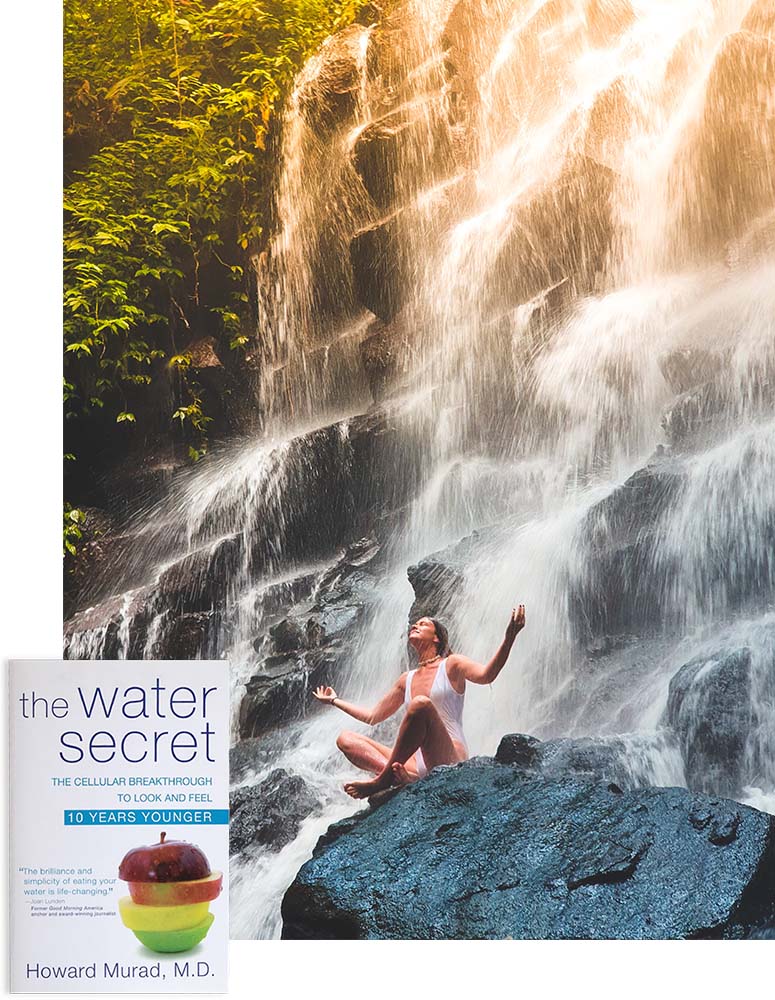Water, water everywhere, and it’s not just what you drink!
As temperatures soar, getting wet is high on our list of priorities. We can’t wait to get to the beach, the lake, the pool, and jump in.
Yet in hot days spent out of doors, it’s more important than ever to stay fully hydrated internally. Hydration is key to avoiding heat stroke and muscle cramps, maintaining cellular health and your skin as a moisture barrier, and even to minimizing the long-term health effects of aging.
Contrary to popular belief, however, hydration is not about the water you drink, but the water you keep. While water you drink is likely to run right through you, water you keep is what constitutes hydration.
That’s why it’s essential that you:
Eat your water.
When the water you consume is in the form of water-rich fresh fruits and vegetables, it is released into your body gradually, over time, and not just flushed through your system and into your urine. Water eaten also is accompanied by fiber, vitamins, antioxidants, and other nutrients that help your body withstand damaging effects of the sun. These nutrients include:
Lycopene, found in many red and orange fruits such as tomatoes, pomegranates, watermelon, and grapefruit
Beta carotene, found in sweet potatoes, carrots, butternut squash, and dark, leafy greens
Vitamins D and E.
It’s also important to
Avoid drinking too much alcohol—it’s dehydrating.
Hydration also requires that you:
Build strong cell membranes.
Keeping water where you want it—in your cells—requires strong cell membranes, which are made up of various proteins and lipids, a key one of which is lecithin. Lecithin is found in the cell membranes of all living things—both animal and plant—and some of the best food sources of lecithin are egg yolks, liver, peanuts, whole grains, milk, and soybeans. I also take lecithin as a supplement to make sure I get enough.
Build muscle.
Because muscle is 70% water, whereas fat is only 10% water, building muscle helps you stay hydrated. That can be counter-intuitive because building muscle often involves sweat. Nevertheless, the water you lose by sweating is short-term and can be replaced, while the muscle you gain will help to keep you hydrated long-term.
Protect your skin.
Your skin is your body’s moisture barrier, literally keeping your organs from drying out. The strateum corneum layer of your skin contains two kinds of natural fats: epidermal and sebaceous.
– Epidermal lipids are a mix of ceramides, free fatty acids, and cholesterol.
– Sebaceous lipids include triglycerides, wax esters, and squalene.
These natural lipids can get washed away by chlorinated pools, saltwater, and hot showers, so they need to be supplemented. And because your skin contains so much surface area that is exposed to sun, wind, pollutants, stress, poor diet, allergens, and lack of sleep, the skin’s moisture barrier, skin often needs the help of:
A topical, lipid-based moisturizer that can replace what your skin has lost: essential fatty acids, ceramides, glycerine, squalene, hyaluronic acid, niacinamide, phospholipids, and panthenol are good ingredients to look for.
Topical sunscreen—preferably a mineral-based block, such as zinc oxide or titanium dioxide rather than a chemical block—to protect your skin—and the rest of you!—from both UVA and UVB radiation. (Current research shows that chemical sunblocks like avobenzone, oxybenzone, and others readily enter the bloodstream and can remain for three weeks or more.)
Although sunscreen is essential to skin health (which means it’s also essential to whole-body health), you should also think of sunscreen as your last line of defense. Other sun-protective measures like hats, sunglasses, shade and avoiding peak sunlight for extended periods of time should be the priority in protecting your skin—and the rest of you!—from dehydration.
Finally, maintaining hydration also requires that you:
Manage your stress and get enough sleep, because stress and sleep-deprivation also take a toll on your skin’s natural lipid barrier and your body’s ability to repair itself.
So, enjoy the water, the sunshine, and the great outdoors—just remember to up your hydration efforts to compensate!
And if you want to learn more about the importance of water to your health and the key to aging beautifully, check out my book, The Water Secret!
DISCLAIMER: The information provided on this site is intended for your general knowledge only and is not a substitute for professional medical advice or treatment for specific medical conditions. You should not use this information to diagnose or treat a health problem or disease without consulting with a qualified healthcare provider, who should also be consulted with any questions or concerns you may have regarding your condition.
